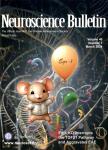Soluble N-terminal fragment of mutant Huntingtin protein impairs mitochondrial axonal transport in cultured hippocampal neurons
Soluble N-terminal fragment of mutant Huntingtin protein impairs mitochondrial axonal transport in cultured hippocampal neurons作者机构:Department of Neurology Second Affiliated Hospital College of Medicine Zhejiang University Department of Neurobiology Key Laboratory of Medical Neurobiology of Ministry of Health of China Zhejiang University School of Medicine
出 版 物:《Neuroscience Bulletin》 (神经科学通报(英文版))
年 卷 期:2014年第30卷第1期
页 面:74-80页
核心收录:
学科分类:0710[理学-生物学] 1002[医学-临床医学] 1001[医学-基础医学(可授医学、理学学位)] 07[理学] 071006[理学-神经生物学]
基 金:supported by the National Natural Science Foundation of China(81271248) the National Basic Research Development Program(973 Program)of China(2013CB530904)
主 题:Huntington mitochondria axonal transport hippocampal neurons
摘 要:Huntington's disease (HD) is an autosomal dominant, progressive, neurodegenerative disorder caused by an unstable expansion of CAG repeats (〉35 repeats) within exon 1 of the interesting transcript 15 (IT15) gene. This gene encodes a protein called Huntingtin (Htt), and mutation of the gene results in a polyglutamine (polyQ) near the N-terminus of Htt. The N-terminal fragments of mutant Htt (mHtt), which tend to aggregate, are sufficient to cause HD. Whether these aggregates are causal or protective for HD remains hotly debated. Dysfunctional mitochondrial axonal transport is associated with HD. It remains unknown whether the soluble or aggregated form of mHtt is the primary cause of the impaired mitochondrial axonal transport in HD pathology. Here, we investigated the impact of soluble and aggregated N-terminal fragments of mHtt on mitochondrial axonal transport in cultured hippocampal neurons. We found that the N-terminal fragment of mHtt formed aggregates in almost half of the transfected neurons. Overexpression of the N-terminal fragment of mHtt decreased the velocity of mitochondrial axonal transport and mitochondrial mobility in neurons regardless of whether aggregates were formed. However, the impairment of mitochondrial axonal transport in neurons expressing the soluble and aggregated N-terminal fragments of mHtt did not differ. Our findings indicate that both the soluble and aggregated N-terminal fragments of mHtt impair mitochondrial axonal transport in cultured hippocampal neurons. We predict that dysfunction of mitochondrial axonal transport is an early-stage event in the progression of HD, even before mHtt aggregates are formed.



